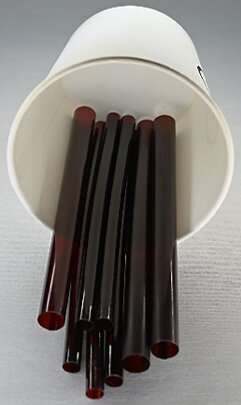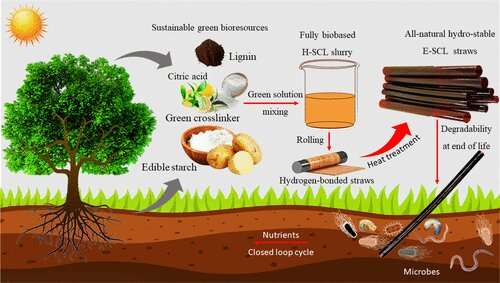This starchy bioplastic could make soggy paper straws a thing of the past

In the fight against pollution, several regions in the U.S. have banned the use of plastic straws. Alternative materials exist, but most options are either too expensive to scale up, go limp in drinks or taste bad. But now, a team reporting in ACS Omega has developed a new type of bioplastic film from all-natural, degradable materials that can be rolled into a straw that doesn’t get soggy and is stronger than plastic.
As efforts to reduce plastic waste take hold, many researchers and companies have turned to plastic alternatives to fabricate straws that comply with new laws and regulations. But so far, most options either end up breaking down in a drink, like paper straws, or require extra steps and energy to manufacture, like metal or sugarcane straws.
But some biopolymers, such as starch and lignin, are readily available as byproducts of other industrial processes and could serve as cheap bioplastic ingredients. Lignin’s natural strength could help overcome starch’s brittleness, especially when combined with a bio-based crosslinker, such as citric acid. So, Dickens Agumba, Duc Hoa Pham and Jaehwan Kim wanted to see if these materials could be combined into a plastic film that was tough, stable in water, yet would still break down when no longer needed.

To create the straws, the researchers blended lignin with either potato starch or polyvinyl alcohol—a more traditional bioplastic material—then added citric acid. They spread the slurry into a thin layer, rolled it into a cylinder and cured it at over 350 F. The bioplastic naturally self-adhered at the seam, but heat treatment set it and made it even stronger. In tests, the cylinders were stronger than those made of polypropylene plastic, yet still flexible.
After two months outside, the plastic straws remained unchanged, while the team’s straws degraded significantly. The bioplastic film also offered UV protection, which could be useful for other applications, such as a coating for greenhouse windows. The researchers say that this material could not only reduce the amount of plastic waste in the environment, but also be used to create other, more sustainable bioplastic products from otherwise wasted materials.
More information:
Dickens O. Agumba et al, Ultrastrong, Hydrostable, and Degradable Straws Derived from Microplastic-Free Thermoset Films for Sustainable Development, ACS Omega (2023). DOI: 10.1021/acsomega.2c07797
Citation:
This starchy bioplastic could make soggy paper straws a thing of the past (2023, March 6)
retrieved 6 March 2023
from https://phys.org/news/2023-03-starchy-bioplastic-soggy-paper-straws.html
This document is subject to copyright. Apart from any fair dealing for the purpose of private study or research, no
part may be reproduced without the written permission. The content is provided for information purposes only.
For all the latest Science News Click Here
For the latest news and updates, follow us on Google News.

